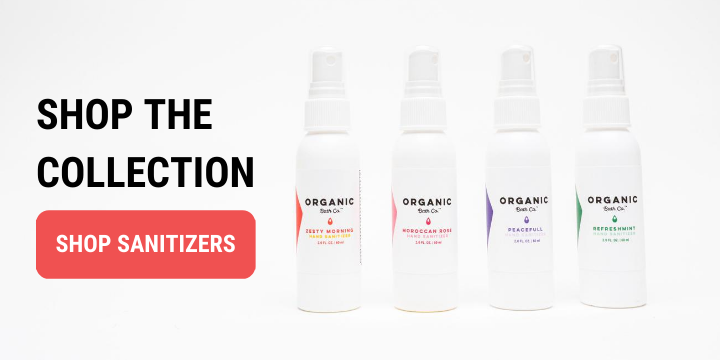Your Cart is Empty
Your Sanitizer Questions Answered
August 13, 2020 3 min read

We've been getting a ton of questions about hand sanitizer lately and we thought we'd share everything that we can to help you make informed decisions about your hand hygiene.
When should I use a hand sanitizer?
The CDC recommends that you use hand sanitizer when soap and water aren't an option. Hand sanitizer is perfect for when you are out and about and do not have access to soap and running water. Hand Sanitizers have been shown to reduce the spread of viruses and bacteria. According to a study by the National Institue of Health, "alcohol-based sanitizers are very effective at quickly destroying a variety of pathogens and that too without the need for water, plumbing, and drying facilities." This makes alcohol-based hand sanitizers a great option to keep with you when traveling anywhere outside of the house.
There are so many alcohols: Ethanol, Ethyl Alcohol, Isopropanol, Isopropyl Alcohol. How do I know what I should be using and what to avoid?
The two common alcohols used in hand sanitizers are Ethanol (Ethyl Alcohol), used to make distilled beverages and Isopropanol (Isopropyl Alcohol) commonly referred to as rubbing alcohol. Ethyl alcohol is denatured before use in hand sanitizer to make it unappealing to ingest. Common denaturants for ethanol include isopropyl alcohol and tert-butyl alcohol which may be referred to as Specially Denatured Alcohol SDA 3C and SDA 40B respectively. Hand sanitizers should never be ingested and may cause alcohol poisoning so make sure to use as directed and supervise children to prevent accidental ingestion.
What percentage of alcohol is best to use? Why shouldn't I just use 100% alcohol?
The CDC recommends using a hand sanitizer with at least 60% ethyl alcohol (or ethanol) or 70% isopropyl alcohol (isopropanol). According to the CDC, "many studies have found that sanitizers with an alcohol concentration between 60–95% are more effective at killing germs than those with a lower alcohol concentration or non-alcohol-based hand sanitizers."
Our 63% Ethyl-alcohol-based hand sanitizer meets the CDC guidelines. Because ethanol is effective in killing microorganisms like bacteria, fungi, and viruses, it is a common ingredient in many hand sanitizers. According to a study published by the National Institutes of Health, ethanol, the most common alcohol ingredient, appears to be the most effective alcohol against viruses.
In that same study, "notably, higher than recommended concentrations are also paradoxically less potent because proteins are not denatured easily without the presence of water."
Additionally, we test every batch with an alcoholmeter to ensure that it is at the correct percentage.
What other ingredients should I look out for and which should I avoid when buying a hand sanitizer?
Alcohol can be extremely drying which is why our hand sanitizer includes glycerin which is a natural humectant and helps your skin to retain moisture that would otherwise be evaporated by using an alcohol-based hand sanitizer. Some sanitizers use aloe vera gel to condition the skin as well to prevent drying. When buying a hand sanitizer, you should avoid products with artificial dyes and colorants as well as artificial fragrances that can irritate the skin and exacerbate skin conditions.
I've seen hand sanitizers with methanol and 1-propanol listed in the news and on recall lists. Is this something I should be worried about?
Methanol, also known as wood alcohol, can be toxic when absorbed through the skin or ingested. According to guidance from the FDA, a number of hand sanitizers distributed from Mexico have been found to be contaminated with methanol. 1-propanol, not to be confused with Isopropyl alcohol is another contaminant that has been found in some hand sanitizers and maybe harmful if ingested. If you are worried you may have purchased one of these sanitizers, you can view the full recall list with disposal instructions here: https://www.fda.gov/drugs/drug-safety-and-availability/fda-updates-hand-sanitizers-consumers-should-not-use
Organic Bath Co. hand sanitizers do not contain methanol or 1-propanol.
Looking for a hand sanitizer that is tough on germs but soft on hands? Shop our hand sanitizers below!
Leave a comment
Comments will be approved before showing up.
Also in Articles

Rescue Your Skin From Holiday Travel Chaos: A Survival Guide for Dry, Sensitive Skin
November 04, 2024 2 min read
Check It Out
Lavender’s Soothing Power: Why Organic Lavender is Perfect for Sensitive Skin
November 01, 2024 4 min read
Check It Out Recent Articles
- Rescue Your Skin From Holiday Travel Chaos: A Survival Guide for Dry, Sensitive Skin November 04, 2024
- Rosehip Oil: The Natural Skincare Superstar November 02, 2024
- Lavender’s Soothing Power: Why Organic Lavender is Perfect for Sensitive Skin November 01, 2024
- Skin Benefits of Cranberry Seed Oil: The Ultimate Superfood for Your Skin October 31, 2024
- Face Oils 101: Why Enhance Face Oil is Perfect for All Skin Types October 30, 2024
Subscribe
Sign up to get the latest on sales, new releases and more …


